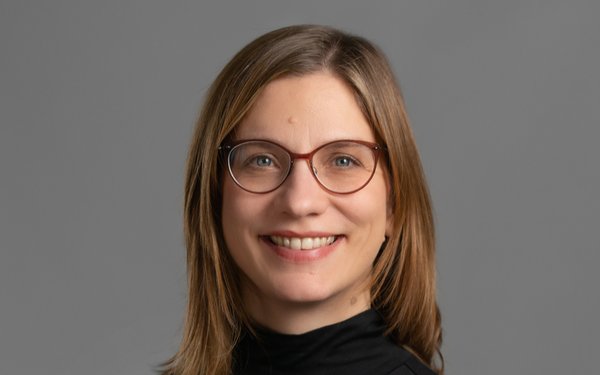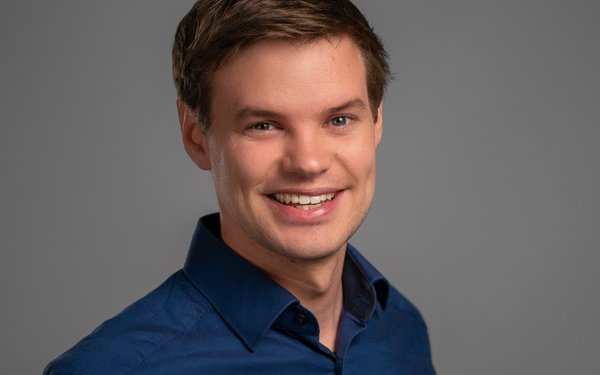Hightech Agenda Professors
As part of the Free State of Bavaria’s Hightech Agenda, the University of Augsburg has already been able to make appointments for 29 of 33 new professorships. (This website is continually updated.)
Prof. Dr Maria Backhouse
Prof. Dr Maria Backhouse conducts research on global socio-ecological inequalities, the socio-ecological transformation, conflicts in the context of the climate crisis, renewable energies, and climate adaptation at the Centre for Climate Resilience. She focuses on topics in Western Europe, South America, and in particular in Brazil. She previously held the position of junior professor of global inequalities and socio-ecological change at the Institute of Sociology at Friedrich Schiller University Jena.

Prof. Dr Janina Bahnemann
Prof. Dr Janina Bahnemann conducts research on cell culture and microsystems technology, as well as the development of “lab-on-a-chip-based” biosensors at the Institute of Physics. Using modern, high-resolution 3D printers, her research group is developing microfluidic systems used in cell culture technology. The working group is also involved in the development of new analytical methods for the online monitoring of biological processes.

Prof. Dr Benedikt Buchner
Prof. Dr Benedikt Buchner’s research focus lies in the areas of civil law, health and medical law, and data protection law. As a lawyer, he contributes his legal expertise to the development of solutions to the challenges of the digital age. Through this research professorship, he is contributing to the development of the university’s research focus on digital health research and artificial intelligence.

Prof. Dr Sina Fontana
Prof. Dr Sina Fontana holds the Chair of Public Law and Crisis Resilience. She conducts research in public law in its international and comparative dimensions, with a special focus on environmental and climate protection law, migration and integration law, including perspectives on equality and diversity.

Prof. Dr. Annemarie Friedrich
Prof. Dr. Annemarie Friedrich holds the newly created professorship for Natural Language Understanding with a focus on Digital Humanities at the Faculty of Applied Computer Science at the University of Augsburg since June 2023. The focus of the professorship is computational linguistics and natural language processing with a focus on semantics and language understanding. Her research interests range from linguistic annotation to discourse processing and machine learning. The corpus-linguistic part of her research focuses on interactions at the interface between syntax and semantics. She is also working in the area of text mining for the scientific domain.

Prof. Dr. Sarah Friedrich
Sarah Friedrich has held the newly created Chair of Mathematical Statistics and Artificial Intelligence in Medicine at the Faculty of Mathematics, Natural Sciences and Technology at the University of Augsburg since September 2021. Her research focuses on areas of medical statistics, especially in the context of small samples, which are common in medicine. She also works on the use of classical statistical methods in modern AI applications in order to make them more transparent and comprehensible and to avoid bias.

Prof. Dr Anja Göritz
Prof. Dr Anja Göritz holds the Chair of Behavioural Health Technology, which conducts research on the use of modern computer technology to record and improve health and well-being. Her research focuses on the effects of internet- and mobile-based interventions on health-related behaviour. She previously held positions as professor of work and organisational psychology at the University of Würzburg and as professor of business psychology at the University of Freiburg.

Prof. Dr Markus Keck
Prof. Dr Markus Keck holds the Chair of Urban Climate Resilience. Following positions at the University of Göttingen and Goethe University Frankfurt am Main, he held a temporary professorship at the Department of Geography at the University of Bonn. His research concentrates on questions such as how social change shapes the natural environment and how global climate and environmental change shapes societies. He aims to examine currently discussed proposals for solving the challenges of a human-dominated era as well as develop possible alternatives.

Prof. Dr Jakob Kottmann
Prof. Dr Jakob Kottmann’s research is interdisciplinary and located at the interface between computer science, physics, and chemistry. His research concentrates on the development of hybrid algorithms, that is, algorithms that are partly performed on quantum computers and partly on classical computers. Such algorithms are used to calculate the properties of chemical substances, for example. As part of his research, Kottmann develops software to test and exchange algorithmic ideas, as for example with an abstraction system for variational quantum algorithms.

Prof. Dr Martin Kronbichler
Prof. Dr Martin Kronbichler researches and teaches at the Institute of Mathematics. His research is interdisciplinary and combines the mathematics of numerical methods for the simulation of complicated physical facts with a strong application orientation, as well as elements of computer science, to improve the efficient use of modern computers. He works on especially efficient software implementations of numerical methods, as well as on simulations of flows in aero and fluid dynamics and biomedicine.
Prof. Dr.-Ing. Philipp Lechner
Prof Dr Philipp Lechner conducts research in the field of data-driven materials processing at the Faculty of Mathematics, Natural Sciences and Technology. His research interests include sustainable processes in foundries, data-driven control of production processes and physically informed machine learning in manufacturing technology.

Prof. Dr Nils Meyer
Prof. Dr -Ing. Nils Meyer works on algorithm-based product development at the Institute for Materials Resource Management (MRM). His research focus lies in the structural optimisation of components, the development of virtual process chains for the digital mapping of a component’s life, and the integration of sustainability goals into optimisation. In future, he will be involved in teaching in the degree programme Materials Science and Engineering on the topics of digital materials and sustainability, as well as in other degree programmes with a focus on digitalisation.

Prof. Dr Angela Oels
The internationally renowned climate researcher Prof. Dr Angela Oels works at the Centre for Climate Resilience. From a democratic theory perspective, she researches how stakeholder participation processes in climate adaptation can be designed to trigger social change, thus contributing to desirable climate futures. In the context of the concept of smart cities, she is also investigating the role of digitalisation in the adaptation to climate impacts. In addition, she critically accompanies debates about “climate refugees” in the context of international climate negotiations.

Prof. Dr. Manuel Ostermeier
Prof. Dr. Manuel Ostermeier holds the Chair of Resilient Operations at the Center for Climate Resilience of the University of Augsburg. His research focuses on sustainable and resilient delivery and logistics concepts, as well as sustainability in agricultural planning problems and in the healthcare sector. Exemplary topics are food supply chains and the avoidance of food waste, as well as last-mile deliveries with autonomous robots. In terms of content, the chair is dedicated to the combination of classic operational issues along the value chain and climate-induced changes to framework conditions and restrictions for planning.

Prof. Dr. Stefania Petra
Prof. Stefania Petra's focus in research and teaching is on fundamental problems in mathematical image processing and resulting application projects. She employs methods of numerical optimization and Compressed Sensing for problem modeling, complemented by current techniques in machine learning. Her particular interest lies in the mathematical foundation of 'explainable AI' and the integration of data-driven and model-based mathematical methods. The application projects currently reside in the field of Life Sciences with the potential for further application areas. She plans to strengthen interdisciplinary research to advance innovative ideas and fortify the bridge between fundamental research and applications.
Prof. Dr Jan-Frederik Pietschmann
Within the context of the Hightech Agenda, the new Chair of Inverse Problems has been created in association with the Centre for Advanced Analytics and Predictive Sciences (CAAPS). The focus of Prof. Dr Pietschmann’s new chair is inverse problems, namely mathematical problems in which unknown parameters are determined by measurements or data, a classic example of which is computerised tomography. The team will also conduct research on nonlinear partial differential equations.

Prof. Dr. Michael Sailer
Prof. Dr. Michael Sailer conducts research on Learning Analytics and Educational Data Mining at the Faculty of Philosophy and Social Sciences. He deals with topics such as technology-enhanced learning, gamification, AI in education, and the analysis of learning processes as well as the support of such learning processes with the help of technologies. Technology-enhanced teaching is also of interest to him, with a particular focus on how technology is used in teaching. His research is guided by the question of what potential and challenges AI brings for learning in schools and universities. Furthermore, how we can optimally utilize these potentials and what competencies teachers need to exploit this potential.

Prof. Dr Sebastian Scherr
Prof. Dr Sebastian Scherr holds the new Chair for Digital Health Communication at the Institute for Media, Knowledge, and Communication at the University of Augsburg. The research focus of the new chair is digital health communication (e.g., wearables, smart medical devices, artificial intelligence, automation), as well as individual and structural factors influencing the impact of the media on the health sector, especially in the areas of mental health, well-being, and suicide prevention. These topics will also be covered in his teaching.

Prof. Dr Sebastian Schiffels
Prof. Dr Sebastian Schiffels is working on the topics of decision-making behaviour and digitalisation in the health sector at the Faculty of Business and Economics. The methodological basis of his work is the use of empirical data from field and laboratory experiments. In general, his research and teaching focuses on (behavioural) operations management and (healthcare) analytics. Schiffels is a member of the Centre for Interdisciplinary Health Research (ZIG) at the University of Augsburg.

Prof. Dr. Michael Seufert
Networked applications and communication networks are ubiquitous and indispensable today. The work at Prof. Dr. Michael Seufert's chair is therefore of outstanding relevance for the current and future development of our society, economy, and industry. In his research, he adapts methods of artificial intelligence (AI) and machine learning (ML) for use in communication networks and investigates how problems in the network can be detected and how the network can be configured and operated in such a way that the requirements of the applications are met and problems are quickly resolved or do not occur in the first place. For this AI/ML-supported network management, not only objective metrics for detecting problems or evaluating the performance of the network are used, but also subjective experiences of the users are taken into account.

Prof. Dr. Jörg Stückler
Prof. Dr. Jörg-Dieter Stückler holds the professorship for Intelligent Perception in Technical Systems at the University of Augsburg. He works at the interface of computer vision, machine learning and robotics and researches methods and algorithms of visual and multimodal perception in technical systems that interact with their environment. These are, for example, methods that can detect the movement and properties of robots and other objects using sensors so that robots can make decisions about their actions in the environment.

